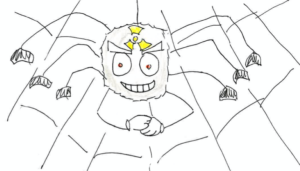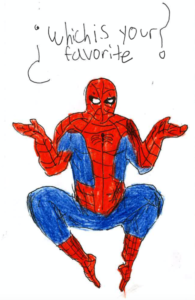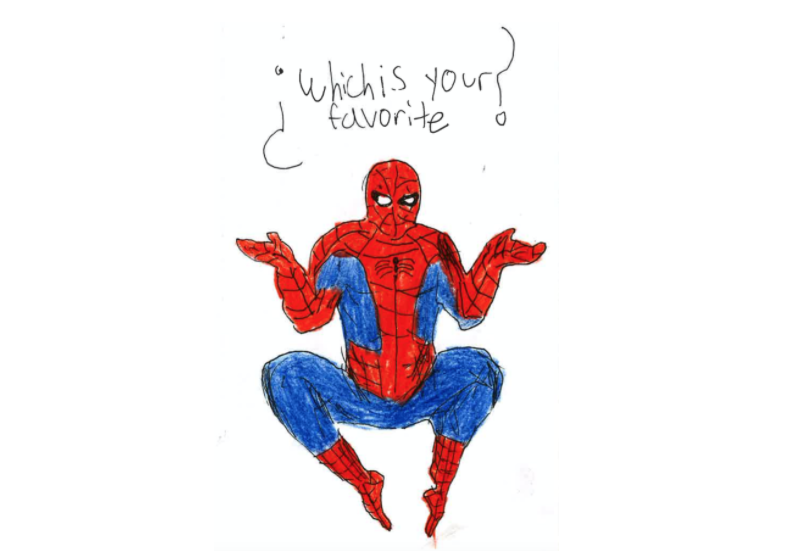Since the web-slinger’s 1962 comic debut, Spider-Man has captured the national imagination. Sporting multiple billion-dollar film franchises, creating an unwavering cult following and inhabiting a constantly-expanding universe, it is clear that Spider-Man is one of the most compelling fictional characters of all time. Despite his tremendous success, though, Spidey has always retained his humble personality, his roots as the “friendly neighborhood Spider-Man.” The beloved Spidey is most often seen solving small-scale problems in his movies and comic books, rather than traveling through time or fighting aliens like other superheroes.
For José Perez, a math teacher at Lick-Wilmerding, the modest nature of the Spider-Man movies has made them deeply relatable and fascinating.
Speaking about recent Spider-Man movies, Perez said that “there is an appeal because there’s always a balance between Spider-Man performing his superhero stuff and his day-to-day. (Compared to other hero movies), that’s more relatable to audiences.”
Spider-Man’s origin story, he said, “is relatively archetypal,” but so “iconic and well-known.” That origin story, a radioactive spider biting a random high school kid, is so incidental that many cannot help but root for Peter, a lovable nerd who never asked for his superpowers.
Even Spider-Man’s creation story follows this theme of random chance. Stan Lee, creator of Spider-Man and co-founder of Marvel Comics, said in a 2000 interview with CNN’s Larry King that he originally got the idea for Spidey’s character from watching a fly walk across his wall, thinking that a person with insect-like powers would make for a great superhero.
From this fleeting thought, in Lee’s immortal words, “a legend was born.”
At the end of the day, that is exactly what Spider-Man is about: creating legends out of the ordinary. Yes, Spider-Man fights evil masterminds daily, saving New York City from fantastical villains. But, Peter also struggles with making good grades in school. He is picked on by his high school bully, Flash Thompson, and he constantly worries about his dandruff.
Peter Parker is remarkably human. For a crime-fighting spider, at least.
Revisiting Spider-Man films, today, has become especially relevant with the recent release of “Spider-Man: No Way Home,” a film which brought back characters and villains from previous Spider-Man series. The film is a culmination of decades of Spider-Man universe-building and plot development.
Below, I have given a review and ranking for each Spider-Man movie — from Tobey Maguire’s 2002 “Spider-Man” to Tom Holland’s 2021 “No Way Home.” There are eight reviews, organized from, in my opinion, the worst film to the best. Included with my thoughts is commentary from Spider-Man fans across the LWHS community.
8. “Spider-Man 3” (2007)
Riding high off the wild success of “Spider-Man 2,” star Tobey Maguire and director Sam Raimi were instantly set-up for success for their finale. To continue in this success, the pair could have created a predictable third film which followed the themes of the first two. Maguire and Raimi, though, decided to take a more radical approach to “Spider-Man 3,” one which would hopefully subvert the audience’s expectations.
And, to its credit, the film did present fans with a radical new take on the beloved Spidey. I just wish, however, that “Spider-Man 3” didn’t subvert audience expectations by thoroughly disappointing nearly everyone who watched it, leaving an irreparable stain on Raimi’s otherwise stellar Spider-Man trilogy.
The harshest criticism for “Spider-Man 3” comes from Maguire’s performance of Venom, the twisted, evil version of Peter. Venom’s character is introduced when a black symbiote falls from space. The symbiote attaches to Peter, infects him and enhances the aggressive aspects of his personality.
Rather than presenting a nuanced character — Peter trying to maintain his humanity against the symbiote’s toxic influence — Maguire portrays a selfish, unlikable version of Peter who is impossible to root for.
Annie Mengarelli ’22 said the way Maguire plays Venom “was like a joke.”
“‘Spider-Man 3’ was supposed to be funny,” she said, “but it was just cringey. It was definitely my least favorite movie.”
To many fans, “Spider-Man 3” represented the exact opposite of what made Spidey so great. The movie is convoluted, and Maguire’s performance is dismal.
“Spider-Man 3” is the most disappointing Spider-Man film ever made.
7. “The Amazing Spider-Man 2” (2014)
To be fair, expectations for “The Amazing Spider-Man 2” were not exactly sky-high when the film was released. Featuring three — yes, three — villains in the initial trailers, the film’s crowdedness was criticized before it even hit theaters. “Amazing 2” was bound to disappoint.
“I liked Electro, the (main) villain,” Mengarelli said, “but the addition of Sand-Man seemed pointless because they already had a villain. There was no need to add him in.”
“Amazing 2” shines, though, in the relationship between Gwen Stacy (Emma Stone) and Peter Parker (Andrew Garfield). The tension between the two is nothing short of riveting — especially during Gwen’s death scene. The scene is beautiful, powerful and heart-wrenching in all the right ways.
The highs of “Amazing 2,” however, do not outweigh the lows. Marvel Studios and Sony Pictures were planning to expand the “Amazing” universe after this film to include the Sinister Six, a group of six supervillains featured prominently in Spider-Man’s comics.
“Amazing 2” was so terrible, though, that Marvel decided to cancel the long-awaited sequels. The story was unsalvageable.

art by Eamon Riley
6. “The Amazing Spider-Man” (2012)
“Amazing 1” took large inspiration from its predecessors, especially from Raimi’s 2002 “Spider-Man.” This is not necessarily a bad thing. However, Webb should have realized that the phenomenal actors he casted were capable of creating something different, and possibly greater, than the original “Spider-Man.”
Garfield was casted into a role which feels terribly unnatural — a nerdy high schooler. Clearly, this role is a direct copy of Maguire’s Peter, and Garfield is simply not believable portraying the character’s somewhat awkward personality. Garfield has other strengths, especially his comedy, which could have been wielded to create a different Peter.
Garfield is a great actor, but he is a miscast for the specific nerdy Peter that “Amazing 1” attempted to present. Martin Sheen and Emma Stone (the actors of Uncle Ben and Gwen Stacy, respectively) also feel misused.
“Amazing 1” is not a bad movie. It is still witty and intimate in every way a Spider-Man fan would expect. However, it will always be frustrating to imagine what could have been if Webb created a unique Spider-Man story — if he crafted roles personally suited for his actors, rather than copying everything which made the 2002 “Spider-Man” great.
At the end of the day, “Amazing 1” is just not a remarkable Spider-Man film. It imitates, rather than innovates, on the time-tested story.
5. “Spider-Man Homecoming” (2017)
When director Jon Watts set out on creating “Spider-Man Homecoming,” kicking-off the most recent Spider-Man trilogy, he did not fall into the trap which doomed “Amazing 1.” Watts chose to change Peter’s story and his community. Namely, the film spends far more time focusing on Peter’s non-superhero life.
Watts’ decision to add the character Ned Leeds perfectly illustrates his decision to humanize Spider-Man. Together, Ned and Peter build Lego Death Stars and play chess between classes. It is exactly what you would expect from best friends in high school; they are always with each other. Even during the fight scenes against The Vulture, the villain in “Homecoming,” Ned is included on screen, assisting Spider-Man behind a computer.
Despite its attempts at novelty, though, some still consider “Homecoming” to be too formulaic.
Perez believes that this predictability is caused by the superhero universe. He said, “In the larger context of superhero movies, in general, I don’t like the idea of the universe because it creates a template for movies. (The template creates) pretty good movies, but they’re all the same.”
“At some point, even if the movie is good, it’s not going to be enjoyable. The movie will be replaceable,” he said.
Despite its best efforts to innovate on Spidey’s classic tale, the place of “Homecoming” in the superhero universe restricts it from telling a radically new Spider-Man story. And, as the third Spider-Man reboot in twenty years, shouldn’t “Homecoming” have been that radical, exiting story?
4. “Spider-Man” (2002)
It is almost funny to look back on “Spider-Man,” now, and remark at the simplicity of the title — it is just “Spider-Man.” And, like the title suggests, this film focuses only on the intimate Spider-Man story, without the excess fluff.
The film opens with Peter Parker in high school. He is described as a social outcast who has a crush on his neighbor, MJ Watson. During a school field trip, he is bitten by a radioactive spider, and he gains superhuman strength, agility and sense. Initially cocky with his new powers, Peter is humbled when he fails to protect his Uncle Ben from a simple thief.
Uncle Ben’s wisdom during his death scene, his immortal phrase “with great power comes great responsibility,” becomes the central tennant for all Spider-Man movies.
2002’s “Spider-Man” is, above all else, a coming-of-age story. By the end of the film, Peter principally learns how to be a good, responsible person. His superpowers are mostly a vehicle to achieve that realization.
For Perez, the intimacy of “Spider-Man” was its strongest aspect. Because it was the first Spider-Man movie to hit theaters, he said, “I didn’t know there was going to be a sequel. I was way more excited for this movie, compared to later movies for which I don’t even have to guess what’s going to happen.”
Without the promise of a sequel, the stakes of “Spider-Man” were higher because audiences did not know, as they do now, that Peter Parker’s actor is bound by contract to return for future movies. Recent films have had trouble recreating this thrilling atmosphere.
3. “Spider-Man: Far From Home” (2019)
“Far From Home” follows Peter and his friends after the events of “Avengers: Endgame,” focusing specifically on how Peter grapples with losing his father figure Tony Stark. Despite its somber storyline, “Far From Home” finds ways to keep Spidey’s story light and refreshing.
The film wastes no time to establish the villain: from the movie’s opening scenes, otherworldly creatures called the Elementals are introduced which can manipulate reality itself. When called to action to fight the Elementals, Peter refuses, instead choosing to join his classmates on a school field trip to Europe.
After the tragic events of “Endgame,” Peter enjoys being able to forget about his Spider-Man persona and live life as a normal teenager. That is until the Elementals show up in Europe, threatening Peter and his friends. Once Peter finds his version of (say it with me) “with great power comes great responsibility,” he joins the fight against the Elementals alongside fellow superhero Mysterio.
Rarely is there a dull moment — from the scenes in which Peter and his teenager friends crack jokes, to the scenes in which Mysterio, the supposed protagonist, is revealed to be a villain scheming against Spider-Man all along.
The consistent twists and turns of “Far From Home” make it the most fun Spider-Man story.
2. “Spider-Man: No Way Home” (2021)
Featuring performances from actors of all the recent Spider-Man movies, “No Way Home” goes above and beyond to provide fans with a thoroughly enjoyable film.
“No Way Home” kicks off as every self-respecting Spider-Man movie should: with Peter and his friends in high school, living out their lives as normal teenages. In “No Way Home,” Peter, MJ and Ned are applying to college. But, because Peter’s identity as Spider-Man (and an incorrect portrayal of him as the “real villain”) was falsified by the evil Mysterio during “Far From Home,” the trio lands only rejection after rejection.
Fearful that his actions jeopardize his friends’ futures, Peter asks Doctor Strange, a wizard with magical powers, to cast a spell that will make everyone forget Spider-Man’s true identity.
Unfortunately, casting the spell goes horribly wrong, bringing Spider-Men and villains from alternate universes to the one inhabited by Holland’s Peter. Shocking long-time fans, Maguire and Garfield return for their roles as Spider-Man, along with many villains — Doc Ock, Electro, Sand-Man, Green Goblin — featured in the classics.
“No Way Home” is unprecedented. Never before in superhero film history have so many beloved actors, from different generations of film franchises, come together to reprise their roles. The film’s execution, too, is outstanding. “No Way Home” manages to pack a myriad of characters — which, quite literally, come from entirely different universes — into a single gripping and phenomenally emotional Spider-Man story.
Mengarelli said, “In ‘No Way Home,’ there were a lot of villains and a lot of things going on. But because I had seen the old (movies), everything made sense to me.”
From the tender moments in which the Peters bond over shared trauma, to the triumphant, unforgettable ones in which they use their unique strengths to fight their villains together, “No Way Home” is bursting with reasons for you to love it.
I certainly could have done without the college storyline — a few rejection letters — serving as Peter’s sole justification for literally endangering everyone in every universe. Besides that gripe, “No Way Home” is a near-perfect conclusion to two decades of Spider-Man films.

art by Eamon Riley
1. “Spider-Man 2” (2004)
There are two camps when it comes to “Spider-Man 2.” The film is either the greatest superhero movie ever made, or it is the greatest Spider-Man movie ever made. Any way you look at it, the legacy of “Spider-Man 2” is untouchable.
The film portrays its protagonist in a brave way that other hero movies seldom take: the superhero on the decline. To say that this approach is a refreshing take on the genre would be a supreme understatement.
Peter’s inability to hold down a job, his romantic relationships and even his motivation to keep being New York City’s Spider-Man is absolutely contrary to the larger-than-life storylines exclusively featured in other superhero movies. (I mean, how many superhero movies can you name in which the main protagonist is getting evicted?)
This normalcy introduced to Peter, however, does not make the film dull.
In the emotional scenes between a miserable Peter and a frustrated MJ, the tension in “Spider-Man 2” is constantly gripping. And, in the combat scenes between Doctor Octopus, a deranged supervillain outfitted with eight tentacle-like arms, the fight choreography and emotional stakes are incredibly intense. It is unbelievable that “Spider-Man 2” was able to pack so much heartbreak and exhilaration into its two-hour run time. “Spider-Man 2” effortlessly strikes the balance between high-stakes excitement and character-driven intimacy, which every other Spider-Man movie attempts, but does not quite achieve.
Perez said that “Spider-Man 2,” as a story, was so compelling because “the characters are much more focused. ‘Spider-Man 2’ is about Maguire’s Spider-Man and the few people he interacts with.”
“Spider-Man 2” — its wit, personality and beauty — embodies Peter Parker better than any other movie in the franchise.






